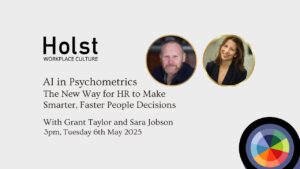The phrase ‘in a world where you can be anything, be kind’, is often bandied around, with #BeKind tagged on Instagram over 10m times. But being kind isn't what we actually need in the workplace. What we really need at work is emotional and social intelligence – specifically social awareness.

Along with regard for others, social awareness is a dimension of social intelligence. Where emotional intelligence is largely about us as an individual, our social intelligence governs how we are with those around us. People with good social awareness typically:
- are observant and attentive
- are considerate of others
- identify and attend to the mood changes of others
These people are usually good team players who genuinely care about and are interested in the well-being and success of those they work with.
Social awareness is looking outward to learn about and appreciate others.
Emotional Intelligence 2.0, Bradberry & Greaves
Social awareness: over & under use
However, as with the other dimensions of emotional intelligence and social intelligence (self-confidence, emotional awareness, emotional regulation and regard for others), social intelligence can be subject to over and under use. Our social awareness can also fluctuate depending on whether we are working under pressure or in more day-to-day conditions.
It is possible to operate with too much social awareness. At the extreme end of the scale, overuse can manifest as suffocating or micromanaging behaviour that is stifling to a team. Even if done with the very best of intentions, being too attentive and observant doesn’t allow others to make and learn from their mistakes. It negatively impacts the autonomy which people need in order to maintain motivation and leaves them thinking “why should I bother to be creative if you were going to micromanage”.
Being considerate of others is one thing, being too considerate is uncomfortable and intrusive. We all need space, even over a Zoom meeting. Although being able to recognise and attend to mood changes is also essential, sometimes we need to be left quietly to our rotten mood and not be over analysed. After all tomorrow will be another and hopefully better day.
The drawbacks of underuse of social awareness are obvious. An unwillingness to tackle deteriorating workplace relationships, lack of consideration for the feelings of others and an inability to understand the mood changes of co-workers and workers. These could be indicative of low morale, and should be investigated.
Social awareness: adjustment
Neither of the above scenarios are healthy in the long term. But with some adjustment it is possible for over and under users of social awareness to bring themselves into the flow zone. Nobody can be perfect and it’s up to the whole team to understand that sometimes we get it wrong. We might miss an obvious emotional signal, or fail to be as considerate as we could have been. The important thing is to create a workplace culture but it is okay to be human, but to work towards the best versions of ourselves on any given day. To not create a blame culture where every error is a hanging offence or leads to being ‘cancelled’.
Developing emotional and social intelligence is not always a comfortable process. We have to take a hard look at our behaviour and reflect on how we could do better. This is almost impossible without intervention and support. With assessment, training and coaching people can make real changes to their work-selves to reduce the risk of burnout and strengthen our relationships with wider positive impact beyond the workplace.
flowprofiler® dimension labs | Social Awareness
flowprofiler® dimension labs help individuals to understand the power skills that make up emotional and social intelligence.
flowprofiler® dimension labs are one hour virtual sessions, each focuses on a single dimension. The session explores that dimension and how it manifests in behavioural terms.
- What is the dimension?
- Why that dimension is important in the workplace
- How to improve the dimension
Register your interest for upcoming flowprofiler® dimension labs here:
flowprofiler® and associated marks are registered trademarks of Chalmers International Limited | All rights reserved
eqflow® and associated marks are registered trademarks of Chalmers International Limited | All rights reserved
resilienceflow® and associated marks are registered trademarks of Chalmers International Limited | All rights reserved
motivationflow® and associated marks are registered trademarks of Chalmers International Limited | All rights reserved





